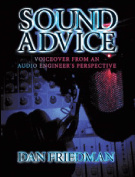Effectively communicating with a voiceover talent during a recording session can be a struggle for clients, or for many new directors. Recently, a client suggested posting “a list of words that can be used to help explain the changes they would like the voice over person to modify.” This sounds like a great idea and an easy thing to do… right? Well, yes… and no. While a list may be helpful in some situations, it would only scratch the surface of what may be involved when directing a voice talent.
Contradiction
Much of the language used when directing seems contradictory. For example, “urgency” almost never means to read the script fast and “intensity” does not mean to shout or automatically give a script the monster truck rally treatment….
“SUNDAY! SUNDAY! SUNDAY! YOU’LL PAY FOR THE WHOLE SEAT… BUT YOU’LL ONLY USE THE EDGE!” 😎
While that delivery is intense… it would be inappropriate on an intense commercial for a hospital. Similarly, while “urgent care” in a hospital means to get care quickly, in a commercial for a hospital, “urgent” usually means to read somewhat slowly, with great concern and importance.
Another term that is used frequently is “cool”. Does this mean cool, as in hip or cool as in calm? Contradictory and/or ambiguous language is just one reason why a list of words or certain terminology will not help in every circumstance.
What’s My Motivation?
Because every talent responds differently to different methods of direction, what works for one talent… may not work for another. While some talent may respond well to simple words or verbal cues, others may need background information such as what the writer’s intention is or in what format will the final production be presented (radio/tv commercial, boardroom presentation, classroom presentation, etc.). Many voice talent like to know the environment in which a scene takes place… for example a coffee shop, city street corner, or bedroom. The same dialog can take place in any of these locations but each may require a different delivery. A voiceover talent may want to hear the music if it has been chosen, or be given specific guidance on inflections or even where to stop and take a breath. The possibilities and combinations of factors are seemingly endless.
Directing, like most things, is much easier after gaining experience. But, the best way to do any job… is by not having to work hard at it. Thankfully, there are a few ways to help you get the delivery you desire with minimal effort and without the need to do much directing. Like many other professions, using the right tools and having the right team can make the difference.
The Tools and the Team
The first best method for getting the delivery you want, is to have a well-written script. Good scripts provide road maps for the voice talent. Proper punctuation, grammar and formatting are helpful, but more importantly, the use of descriptive or illustrative words allow the talent to capture the mood and feel of the message. Unless you are seeking a delivery that is intentionally counterintuitive or completely unique (a character voice for example), the tone of the script should be obvious to the voice talent.
This brings us to the second best method, which is to choose the right talent for the job. Here is where things can get very tricky. A voice may sound great on a demo, but that doesn’t necessarily mean that the voice talent is the right choice for your script. Time and time again… big announcer voices are hired for their vocal quality, but are asked to sound conversational. This usually requires additional time and effort for the delivery to sound believable (as though a “real person” is presenting the information).
Some voice talent are more suited to announcer reads, others are great at sounding conversational and others are good at narrating or story-telling. Some talent can interpret copy flawlessly, while others need extensive direction, instruction and line reads in order to achieve the delivery you are seeking. Some talent can interpret copy very well while acting as a character, but have great difficulty when delivering the same material as themselves. The trouble is, as the client acting as director, you often don’t know what your chosen talent’s strengths and weaknesses are… until after you’ve hired him or her.
With a well-written script, it should rarely take a voiceover talent more than four attempts to get the tone of the delivery correct. The first take should be left to the talent’s interpretation of the script. A good voice talent will usually get reasonably close on the first pass. The second take is used for dialing up or dialing down the energy or for any clarifications on tone or characterization. The third take is for fine-tuning any changes made in take two. By take four, the over all tone will ideally be dialed-in.
No Substitute For Experience… or Great Ears.
Great voiceover talent don’t need much direction and a good script will provide most of the information a voice talent should need. But once the tone and delivery are where they need to be, tweaks and fine-tuning may still be necessary to help the talent provide the best performance possible. This is when experienced audio producers and engineers become an increasingly more valuable part of your team.
Professional audio engineers, who specialize in voiceover, often take on the role of director. They often work with many voice actors and have experience knowing not only what buttons to push on the equipment, but also which buttons to push within the talent that will produce the desired delivery. They may also be responsible for the assembling the final mix and will develop a “vision” for what will help the final production sound best. When you find an engineer who shares your vision, do not hesitate to allow him or her to interpret your needs and communicate them to the talent if you are having difficulty.
Lend Me Your Words
Clearly, there is a great deal involved in directing a voiceover session. While a list of words may not always be helpful or simple to create, there is no reason why we shouldn’t try. I’ve included a few words with their possible meanings in this article. I invite all of you (talent, directors, engineers, coaches… and everyone reading this blog) to add some of your own in the comments section and I’ll compile them for a future post. I look forward to seeing and hearing what you come up with.

 A voiceover demo is your business card. A demonstration of your abilities and talent. It is a reflection of your ability to present yourself as a professional. It is representative of whether you can communicate and deliver copy, but also indicates whether you can hear what it takes to deliver that copy effectively. After all, when it comes to voiceover, communication requires talking as well as listening.
A voiceover demo is your business card. A demonstration of your abilities and talent. It is a reflection of your ability to present yourself as a professional. It is representative of whether you can communicate and deliver copy, but also indicates whether you can hear what it takes to deliver that copy effectively. After all, when it comes to voiceover, communication requires talking as well as listening. Your advertising dollars and your time are important to you. Do you know how to get the most from your voiceover session? Here are my 10 Tips For Getting the Most From Your Voiceover Session.
Your advertising dollars and your time are important to you. Do you know how to get the most from your voiceover session? Here are my 10 Tips For Getting the Most From Your Voiceover Session.


